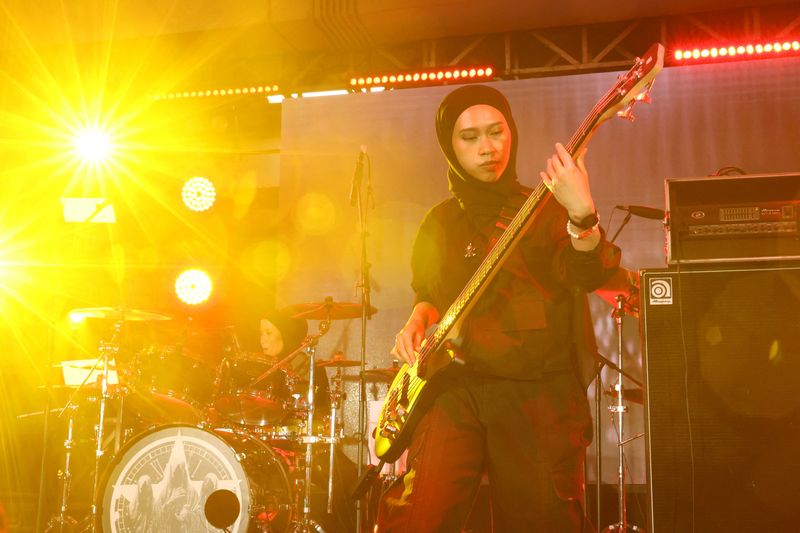By Ananda Teresia and Stanley Widianto
JAKARTA (Reuters) – With their Islamic headscarves and high-octane metal music, the women of the Indonesian band Voice of Baceprot have played stages from the United States to France. But they are nervous about this week.
In England on Friday, the trio will be the first Indonesians to play at the Glastonbury Festival, one of the world’s biggest, sharing space with the likes of Coldplay and Shania Twain.
This is the biggest stage yet for the young women, far from their home village of Garut in West Java province of the sprawling Southeast Asian nation.
“Not only do we carry the Voice of Baceprot, but also our country,” bassist Widi Rahmawati, 23, told Reuters.
With the brash strums of their guitars and intricate drumming, the Voice of Baceprot – a word meaning “noise” – has made the cover of Britain’s New Musical Express magazine and earned plaudits from former Rage Against the Machine guitarist Tom Morello.
Beyond the music, the three have set out to challenge the stereotypes that Muslim women are demure and weak, or that Muslims in general are violent militants, said vocalist and guitarist Firda Marsya Kurnia, 24.
Indonesia is the world’s largest Muslim-majority nation, with Muslims comprising 90% of its 270 million people. The nation is secular and the vast majority practise a moderate form of Islam, although there are some conservative strongholds.
The band sings of female empowerment – lamenting a fixation on looks instead of the music – and the environment, Marsya said.
Widi, Marsya and drummer Euis Siti Aisyah, 24, met at an Islamic school, forming the band in 2014. They were immersed in Indonesian pop and Islamic music as kids, said Widi.
Their love for metal came after they heard the album “Toxicity” by the American band System of a Down. They listened to it on the computer of their school guidance counsellor, who they said was their biggest supporter.
It filled them with an adrenaline rush, Marsya said, so they started playing music of their own.
Marsya said the most difficult challenge for Voice of Baceprot was dealing with stigmas, at home as well as overseas.
“In our village, metal is considered satanic — not suitable for women, let alone women in hijabs,” Widi said, referring to the headscarves.
Marsya said her family once suggested she seek an Islamic healing ritual, hoping to expel her love for metal.
“In the beginning, we felt like we did not have a home to go back to,” she said.
People in a U.S. audience once called them militants, she said. “It was as if we were criminals.”

After Glastonbury, Marsya said the three would work on a new album and a song “Mighty Island”, which she said was about corruption in Indonesia. They also want to build a community with aspiring musicians back home, she said.
“We’d like to empower the community there,” Marsya said.